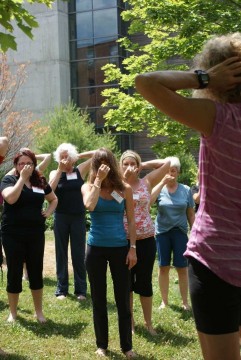
Although pranayama breathing has been studied seriously since the early 90’s, this new study, coming out of Pondicherry, may be the first to compare a month of regular slow breathing practice like alternate nostril nadi sodhana to rapid breathing practice like skull shining Kabalabhati, to a control group who did not do pranayama breathing practice for a month. In this randomized trial, involving approximately 90 healthy female (72) and male (19) subjects, the subjects practiced 30 minutes a day, three times a week, and were encouraged to continue their practice at home. According to Dr. Ananda Balayogi Bhavanani, one of the study’s authors and the Chairman of the International Centre for Yoga Education and Research at Ananda Ashram, Pondicherry, India (www.icyer.com), the fast breathing was practiced at two breaths per second, initially for 30 second then 45 and then 60 seconds for one round. Subjects began by practicing one round, and then up to 3 to 6 rounds per session with relaxation in between.
This study looked at a number of measures to determine pulmonary function parameters (PFT)—basically how well our respiratory system is functioning.
Results of the study show that both slow and fast pranayama practices have beneficial effect on PFT except respiratory pressure parameters, and the effect of fast pranayama was significantly more on forced expiratory function—no surprise, since fast breathing like kapalabhati emphasizes forceful exhalation through the nostrils. Both groups improved basic lung capacity and functioning.
According to the authors, “These changes by both pranayama techniques can be attributed to improved autonomic tone toward parasympathodominance resulting in a relaxed state of mind, better subjective well-being and concentration on the task, improved lung ventilation and strength of respiratory muscles.” My only wish was that in addition to pulmonary measurements, there had been psychosocial testing. Since both slow and fast breathing practices resulted in a “relaxed state of mind,” what was the difference, if any, on the effect on mood? In the field, anecdotally, we see that slow breathing, with an emphasis on the exhale, is calming, while more rapid breathing is both stimulating (mind feels more focused) and relaxing (body is relaxed).
T Dinesh1, GS Gaur2, VK Sharma2, T Madanmohan3, KT Harichandra Kumar4, AB Bhavanani, “Comparative effect of 12 weeks of slow and fast pranayama training on pulmonary function in young, healthy volunteers: A randomized controlled trial,” International Journal of Yoga, 2015, Volume : 8, Issue : 1, Page : 22-26
To read the full article, click here.
The paper is actually the third in a series of comparing fast and slow pranayama breathing. The links to the other two are below:
Effect of fast and slow pranayama practice on cognitive functions in healthy volunteers